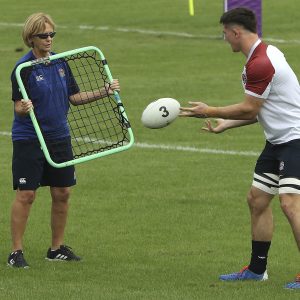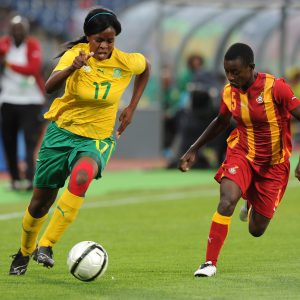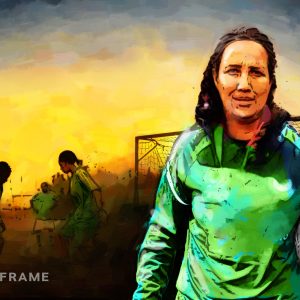Blowing the whistle on patriarchy
As players turned referees, Akhona Makalima and Aimee Barrett-Theron are trailblazers in the male-dominated sports of football and rugby. They share the ups and downs of their jobs.
Author:
5 May 2021

It’s becoming an increasingly familiar sight. The Super Bowl final in February witnessed its first female referee in Sarah Thomas serving as down judge in the American football showpiece. In England the following month, Rebecca Welch became the first woman to officiate an English Football League game. And over in Australia, Amy Perrett had already made history by becoming the first woman to take charge of a Super Rugby match.
It’s no different in South Africa. Two women in particular have been quietly forging a path in their respective male-dominated fields: Akhona Makalima on the football field and Aimee Barrett-Theron as a rugby referee.
They followed similar paths from player to referee. But while there are resemblances in their training, focus, passion and goals for the future, responses to their choice of profession have varied. Makalima has had to deal with more negativity, although this is reflective of how referees are treated generally in football as opposed to rugby. Welsh rugby referee Nigel Owens famously responded to a player by saying “this is not soccer” and threatening to penalise him further if he continued complaining. Another time, he commented: “The football stadium is 500 yards that way.”
Makalima and Barrett-Theron have experienced this aspect of refereeing, but neither is swayed by the opinions of others.

Makalima, known as SheRef on social media platforms, was born and raised in Nqamakwe in the Eastern Cape. She enjoyed sport at school, but played rugby and baseball before taking up football.
“My mother never wanted me to play football. She wanted me to go to school and study. Football was not something very popular in my village, especially for a woman. But my grandfather would always be cheering for me … Eventually my mother became my biggest fan when she saw that I finished school and graduated and all of that.”
Makalima went on to represent her province but stopped playing when she left college in 2011.
“Just when I was retiring, the South African Football Association (Safa) were looking to develop female referees and I remember telling myself I didn’t want to fall out of football because I love it. I’m passionate about sports and I was like, okay, I’m joining refereeing. I stopped playing in 2011 and I started attending referee courses. The rest was history.”
Makalima has excelled since then, recently returning from the men’s CAF Under-20 Africa Cup of Nations (Afcon) in Mauritania, where she was the only female referee to officiate. She’s been involved across the country’s domestic football competitions as well as the high-profile women’s Olympic qualifier between Cameroon and Ivory Coast in 2019.
Related article:
Likewise, Barrett-Theron discovered her passion for rugby early on. She rose quickly through the school, club and provincial ranks growing up in Durban, before being selected to play for South Africa. After representing the country at Sevens and 15s World Cups, she called it quits in 2013 but also couldn’t leave the game completely.
“I was fortunate enough to get my university bursary and travel the world playing the game that I love, so it was a way for me to stay involved in rugby and provide that service to the game. It was an easy decision at the time. Actually, doing the reffing was incredibly tough but absolutely worthwhile from then on.
“Reffing is a whole different physical, mental and emotional challenge. I enjoyed putting my body on the line for my team when I was playing and being able to explore rugby and challenge myself when I have that whistle, it’s just a way for me to grow and improve and be involved in the game.”
Barrett-Theron has officiated since then in Sevens at the Olympic Games and the women’s World Cup, and more recently made her debut in the men’s Super Rugby Unlocked. She’s South Africa’s first professionally contracted female referee and while that pays some of the bills, she also runs a biokinetics practice.
Sexism and being undermined
Makalima and Barrett-Theron knew what they were up against, heading into sporting domains long dominated by men. And while they didn’t necessarily set out to be pioneers, that’s certainly what they’ve become.
“Some of the difficulties I’ve had is hearing comments like: ‘Does she know what she’s doing? Is she even qualified? We don’t need women in the men’s games, these women always want to do everything that men are doing, they want to be men.’ So I get those things. Or, ‘Akhona, you belong in the kitchen,’ or ‘Why not play netball?’” said Makalima.
“An aggravating thing is that people feel like I’m a distraction to men or to players. Maybe they will look at your body and say things that are really harmful and hurt you. I don’t mind anymore, those comments don’t break me, they don’t do anything anymore because I am a woman at the end of the day. I don’t want to be a man.
“I want to be a beautiful woman in a male-dominated world … If they are distracted by me, it means they are not professional enough. But I don’t think the players are distracted. I feel like people that are watching, they are rather distracted. I feel like players are very professional. They are there to work and I am there to work.”
Related article:
Barrett-Theron has seldom experienced these kinds of comments. She made a conscious effort not to be antagonistic in her approach. “When I first decided that I was going to get into rugby and reffing, I knew it was very male-dominated so I didn’t come in wanting to fight a battle.
“People can have their opinions. But at the end of the day, I try to be as authentic as possible and rather than fighting that battle of going to everyone and telling them how wrong I think they are, I choose to get on to the field and prove them otherwise.
“People are getting used to me. The players call me Aimee now rather than Sir,” she added with a smile.
The pressure is certainly on when the two women take the field, with all eyes on them and critics ready to pounce on mistakes. Their response is to work as hard as possible to be at their best and minimise the chance of errors.
Related article:
“Passing a men’s fitness test simply means that you need to work extra, you have to be dedicated, you need to be very strong mentally. I train a lot. I am very dedicated, disciplined and committed to my training, to what I eat, to my rest days. I don’t play around with my training,” explained Makalima.
Barrett-Theron agreed: “Fitness is an absolute key component to reffing. We have the tough job of having to keep up with the players, even be one step ahead of the players, and still be able to think and make decisions. We’re making decisions constantly throughout the game and you’ve got to still be fresh in your mind and fresh in your legs. You’re covering 6km to 8km a game, if not more … It really is an intense challenge for the body as well as the mind.”
Barrett-Theron acknowledged the support she has received from her male colleagues off the field. “I’ve been very fortunate, especially in the last few years, to be on the panel with an incredible group of gentlemen,” she said. “They have really taken me – initially under their wing – looked after me, supported me, protected me, taught me, shared their experiences… And now it’s not just under their wing, it’s shoulder to shoulder and I’m just incredibly blessed to have some of the world’s best in my corner.”
Makalima was full of praise for the support she has received from Safa. “I’m very proud of the South African Football Association for the development of women referees. And together with the ladies soccer teams that are coming up with the national league, it’s also helping the female referees to come up.
“It is annoying that it’s still a big deal for a woman to be officiating a man’s game, but I feel like it’s a process. Remember when you are introducing something new to people it takes time for them to digest things, for them to appreciate it, for people to get it.
“Slowly but surely I feel like people are seeing that women are there, we are not going anywhere.”
Future goals
Barrett-Theron is not bothered by any possible negativity. “I think one of the things I’ve learnt being a referee is that there’s really not that much that bothers me. For me, it’s been an absolute honour and privilege to be a female referee of many firsts in South Africa and I think we are definitely getting to a stage where this is the norm.”
In making these breakthroughs, both referees have become role models to other women and girls hoping to follow a similar path. It’s not something with which Barrett-Theron is necessarily comfortable, but she still relishes the role. As does Makalima.
“I think it’s not in my personality to really step up and take the limelight. I’d much prefer to fly under the radar and just do a good job. But what I’ve seen over the years is that me performing well on the rugby field means so much to other women in the game, other women in sport, even other women in business. So I really cherish that and I hope that I can continue to do that for women in sport,” said Barrett-Theron.
“I’ve always wanted to remain kind and humble. I think I am a trailblazer, I feel like I am a role model and an inspiration to the young girls. From the response I’m getting from the girls, from the young referees, even some male colleagues, I feel like, yeah, I am an inspiration, I am a motivation.”
Related article:
As for the duo’s long-term goals, these also run along the same lines: to conquer even more new ground.
“I’d like to establish myself as a regular in the domestic scene, in the Currie Cup and the other competitions,” said Barrett-Theron. “And to really establish myself on the national panel. I’d love to dream big and ref a men’s international. That would definitely be one of the goals. Then in the women’s game, I’d love to establish myself as one of the top performers, being able to ref those top play-off games and those big classic clashes.”
Makalima said: “I must work super hard to get regular game time in the Premier League. Also, to at least get the Referee of the Season [award] in the country. I’m also looking forward to conquering my region, getting some finals under my belt in the Cosafa, and gradually going up at the CAF and making good strides there, going to a men’s Afcon. And obviously I want to go to the World Cup, that is my biggest dream. That’s what I want to achieve before I retire.”
Considering what this hard-working, dedicated and fearless pair have already accomplished and the barriers they’ve demolished along the way, you wouldn’t bet against them.




